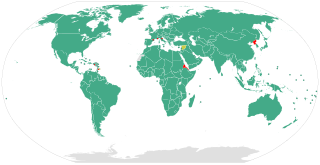 W
WThe Brazilian Anti-Corruption Act officially "Law No. 12,846" and commonly known as the Clean Company Act is a Brazilian law enacted in 2014 targeting corrupt practices among business entities doing business in Brazil. It defines civil and administrative penalties, as well as the possibility of reductions in penalties for cooperation with law enforcement under a written leniency agreement signed and agreed to between the business and the government.
 W
WThe United Nations Convention against Corruption (UNCAC) is the only legally binding international anti-corruption multilateral treaty. Negotiated by member states of the United Nations (UN) it has been adopted by the UN General Assembly in October 2003 and entered into force in December 2005. The treaty recognise the importance of both preventive and punitive measures, addresses the cross-border nature of corruption with provisions on international cooperation and on the return of the proceeds of corruption. The UN Office on Drugs and Crime (UNODC) in Vienna serves as Secretariat for the UNCAC. UNCAC's goal is to reduce various types of corruption that can occur across country borders, such as trading in influence and abuse of power, as well as corruption in the private sector, such as embezzlement and money laundering. Another goal of the UNCAC is to strengthen international law enforcement and judicial cooperation between countries by providing effective legal mechanisms for international asset recovery.
 W
WInternational asset recovery is any effort by governments to repatriate the proceeds of corruption hidden in foreign jurisdictions. Such assets may include monies in bank accounts, real estate, vehicles, arts and artifacts, and precious metals. As defined under the United Nations Convention against Corruption, asset recovery refers to recovering the proceeds of corruption, rather than broader terms such as asset confiscation or asset forfeiture which refer to recovering the proceeds or instrumentalities of crime in general.
 W
WA long series of criminal investigations have occurred in Brazil associated with Operation Car Wash, since the first one began in March 2014. These investigations are considered offshoots of the original phased investigations.
 W
WOperation Car Wash was a criminal investigation by the Federal Police of Brazil, Curitiba Branch. It began in March 2014 and was initially headed by investigative judge Sergio Moro, and in 2019 by Judge Luiz Antônio Bonat. It has resulted in more than a thousand warrants of various types. According to the Operation Car Wash task force, investigations implicate administrative members of the state-owned oil company Petrobras, politicians from Brazil's largest parties, presidents of the Chamber of Deputies and the Federal Senate, state governors, and businessmen from large Brazilian companies. The Federal Police consider it the largest corruption investigation in the country's history.
 W
WA long series of criminal investigations have occurred in Brazil associated with Operation Car Wash. The first investigation was launched in March 2014, and is now known as phase 1 of the investigation, with subsequent inquiries numbered sequentially and having code names such as phase 2, phase 3, and so on. By September 2020, there were 74 announced phases of Operation Car Wash.
 W
WThe 2017–19 Saudi Arabian purge was the mass arrest of a number of prominent Saudi Arabian princes, government ministers, and business people in Saudi Arabia on 4 November 2017 and the following few weeks after the creation of an anti-corruption committee led by Crown Prince Mohammed bin Salman.
 W
WTied aid is foreign aid that must be spent in the country providing the aid or in a group of selected countries. A developed country will provide a bilateral loan or grant to a developing country, but mandate that the money be spent on goods or services produced in the selected country. From this it follows that untied aid has no geographical limitations.